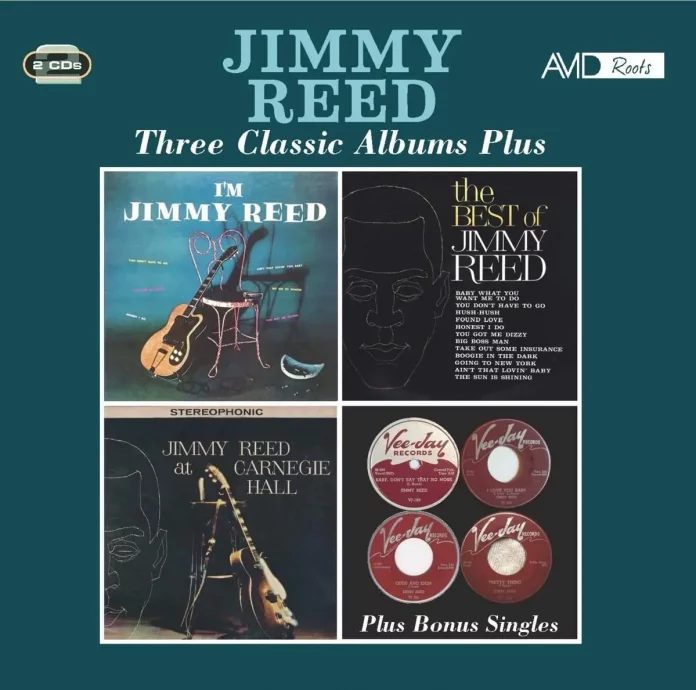Despite not being a household name, Jimmy Reed is arguably the most influential blues player of his generation. B. B. King, Howlin’ Wolf, Muddy Waters and Robert Johnson may all be better known but the list of artists who have recorded Reed’s songs or claimed to be influenced by him is quite staggering. They include Elvis Presley (Big Boss Man, Baby, What You Want Me To Do), The Rolling Stones (Ain’t That Lovin’ You Baby, The Sun Is Shining, Bright Lights, Big City, Shame, Shame, Shame), The Yardbirds, Van Morrison, Grateful Dead, Wishbone Ash, The Steve Miller Band and last but not least, Bob Dylan, who wrote the song Goodbye Jimmy Reed as a tribute to the legendary bluesman. Many listeners will be more familiar with Reed’s songs than the man himself.
Reed was one of 10 children born in Leland, Mississippi. It is said that at the age of seven he was able to pick out on a guitar the tunes that caught his fancy. Given the size of the family, it was expected that Reed earn his keep from an early age. With only three years of formal education, Reed left home aged 15, to work in an iron foundry in Gary, Indiana. He would practise his guitar during his lunch break and after two years he left to seek work on the Chicago blues circuit. His big break came following a meeting with Vivian Carter (co-owner of the newly formed Vee Jay label) who signed him on the spot. His first recording, You Don’t Have To Go, was a success and was followed by many more including Honest I Do, which was a monumental hit, spanning both the mainstream US pop charts and the Billboard R&B charts.
Reed’s wide appeal is readily understandable. His style is relaxed, compelling and even sophisticated compared to that of many of his contemporaries. He allows country blues to merge with urban blues, each strengthening the other. His music feels modern and is a far cry from the morbidity of other Delta blues players at the time; and his music is equally at home on the radio as well as the dance floor.
Reed was prone to epileptic fits, but this was not correctly diagnosed for a very long term. He also had a serious alcohol problem and became increasingly dependent on his wife, Mama Reed, to help him remember his lyrics.
Reed’s commercial success was essentially tied up with the success of Vee Jay Records and when the label folded in 1966, he ran out of hit songs. Like many of his generation, he toured Europe as part of the folk blues revival but died in 1976 at the age of 50. He was inducted into the Blues Hall of Fame in 1980 and the Rock and Roll Hall of Fame in 1991.
Reed is a legend and I venture to suggest that without him the British blues boom of the 1960s, which influenced pop and rock, would have sounded very different. This compilation of three classic albums and numerous singles is a treasure and should be enjoyed by everyone with an interest in the blues and the evolution of modern popular music.
Discography
CD1: [I’m Jimmy Reed and The Best Of Jimmy Reed + bonus singles 1953-1961] Honest I Do; Go On To School; My First Plea; Boogie In The Dark; You Got Me Crying; Ain’t That Lovin’ You Baby; You Got Me Dizzy; Little Rain; Can’t Stand To See you Go; Roll And Rhumba; You’re Something Else; You Don’t have To Go; Baby What You Want Me To Do; You Don’t Have To Go; Hush Hush; Found Love; Honest I Do; You Got Me Dizzy; Big Boss Man; Take Out Some Insurance; Boogie In The Dark; Going To New York; Ain’t That Lovin’ You Baby; The Sun Is Shining; Shoot My Baby; You Upset My Mind; State Street Boogie; You Gonna Need My Help; Sugar Sugar; Lookin’ For You Baby (81.01)
CD2: [Jimmy Reed At Carnegie Hall + bonus singles 1953-1990] Bright Lights, Big City; I’m Mr. Luck; Baby What’s Wrong; Found Joy; Kind Of Lonesome; Aw Shucks, Hush Your Mouth; Tell Me You Love Me; Blue Carnegie; I’m A Love You; Hold Me Close; Blue Blue Water; High And Lonesome; I Found My Baby; Jimmy’s Boogie; Pretty Thing; I’m Gonna Ruin You; I Don’t go For That; She Don’t Want Me No More; Baby Don’t Say That No More; I Love You Baby; Honey Don’t Let Me Go; Honey, Where You Going; Signals Of Love; I’m Gonna Get My Baby; Odds And End; I Told You Baby; You Know I Love You; Where Can You Be (75.47)
Reed (v, g, hca); Remo Biondi, John Brim, “Lefty” Bates, Phil Upchurch (g); Eddie Taylor, Willie Dixon (b); Vernel Fournier, Albert King, Earl Phillips (d) and others. I’m Jimmy Reed was recorded in Chicago, June 1953 to March 1958. Jimmy Reed At Carnegie Hall was recorded in Chicago, 1961. The Best Of Jimmy Reed was recorded in 1961. No dates are given for the various bonus singles.
AVID Roots AMSC14440
















